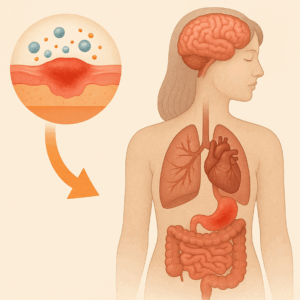How Acute Inflammation Turns Chronic — And Why It Affects Your Mental Health
 When we think of inflammation, most of us imagine swollen joints, a sore throat, or redness around a wound. That’s acute inflammation — the body’s quick, protective response. It fights off infection or heals injury, then usually subsides.
When we think of inflammation, most of us imagine swollen joints, a sore throat, or redness around a wound. That’s acute inflammation — the body’s quick, protective response. It fights off infection or heals injury, then usually subsides.
But when inflammation doesn’t turn off, it becomes chronic inflammation — a slow-burning process that can last for months or years. And it doesn’t just harm physical health. It also plays a quiet but powerful role in shaping our mental health and emotional well-being.
Chronic inflammation and the brain
Persistent inflammation disrupts how the brain functions. Research links it to:
-
Depression: Ongoing immune activation alters serotonin and dopamine pathways, deepening low mood.
-
Anxiety: Inflammation triggers stress hormones like cortisol, keeping the body in “fight-or-flight” mode.
-
Cognitive fog: Inflammatory chemicals slow brain signaling, leaving you with poor focus and memory lapses.
-
Sleep disruption: Restless nights feed back into inflammation, creating a vicious cycle.
-
Sexual health issues: Inflammation affects hormone levels and vascular function, lowering libido and impairing performance.
Common signs of chronic inflammation
It rarely looks dramatic. Instead, it creeps in through subtle, everyday symptoms:
-
Persistent fatigue or lack of motivation
-
Irritability, low mood, or heightened anxiety
-
Brain fog, poor concentration, forgetfulness
-
Digestive troubles (bloating, constipation, diarrhea)
-
Loss of interest in intimacy or relationships
These can easily be mistaken for “just stress” or “burnout,” but chronic inflammation often lies underneath.
What keeps the fire burning?
-
Lifestyle factors – Smoking, processed foods, alcohol, sedentary habits.
-
Unresolved infections or toxins – When the immune system can’t clear the problem.
-
Autoimmune conditions – The body mistakenly attacking itself.
-
Unmanaged stress – Long-term stress is itself inflammatory.
Breaking the cycle: mental health first
-
Nutrition for the brain: Anti-inflammatory diets (vegetables, whole grains, omega-3s, turmeric).
-
Movement as therapy: Regular exercise lowers inflammatory markers and improves mood.
-
Therapy and mindfulness: Reduce stress-driven inflammation by calming the nervous system.
-
Restful sleep: 7–8 hours of quality sleep helps reset immune and emotional balance.
-
Seek early support: A psychiatrist, psychologist, or counselor can help you address both the mental and physical aspects.
Final word
Chronic inflammation is more than a medical buzzword. It shapes how you feel, think, and even connect with others. If you’re struggling with fatigue, low mood, anxiety, or intimacy issues, it may be more than “just stress.”
📍 At Apollo Clinic, Velachery (Opposite Phoenix Mall, Chennai), we offer confidential consultations that integrate sexual health, mental health, and overall well-being — so you can heal inside and out.
Dr. Srinivas Rajkumar T
MD (Psychiatry), AIIMS New Delhi
Consultant Psychiatrist – Child, Adult & Geriatric Psychiatry
Apollo Clinic, Velachery, Chennai
📞 Contact/WhatsApp: 85951 55808